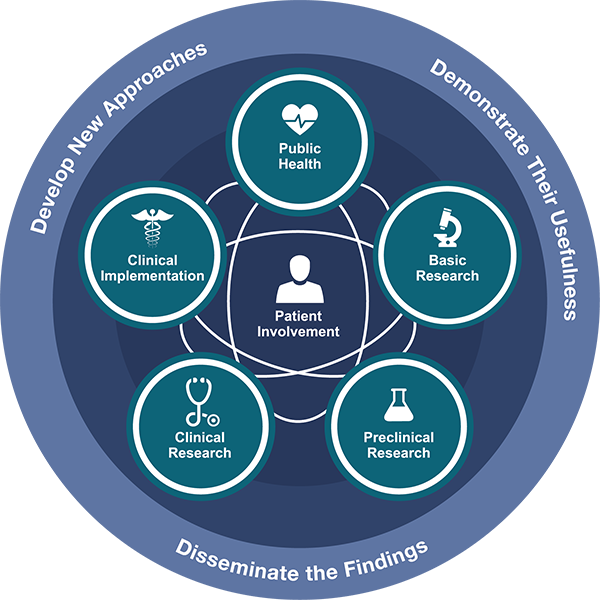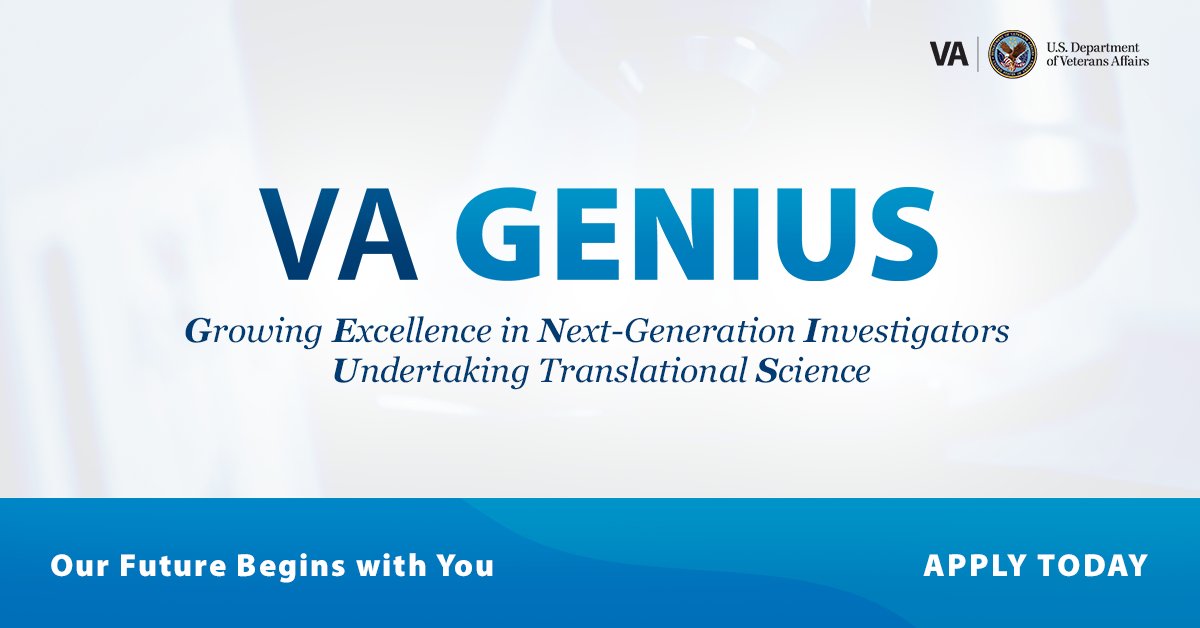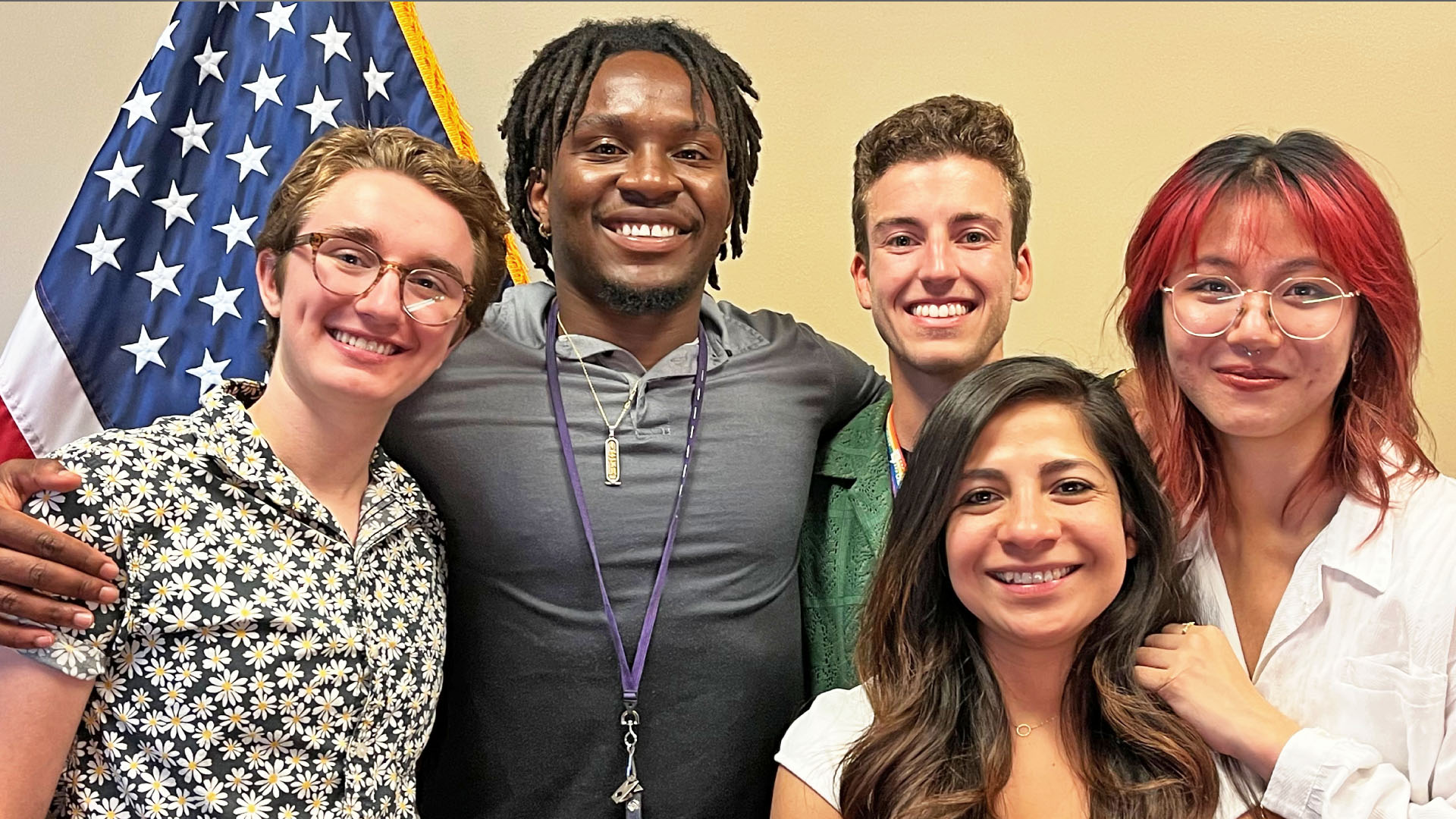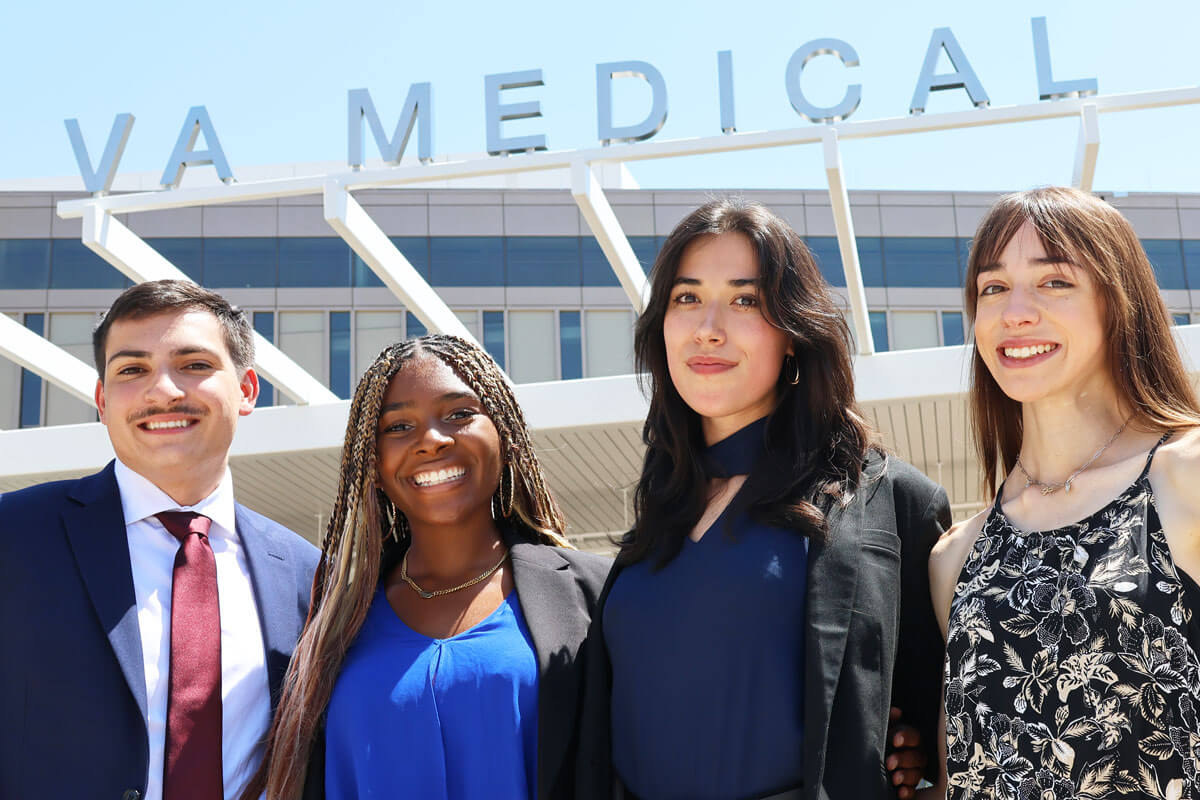VA GENIUS

Summer Research Program
ON THIS PAGE
Thank you for your interest in the VA GENIUS Program. We are no longer accepting applications for Summer 2025. The application portal will reopen in Fall 2025. We wish you ongoing success in your academic endeavors.
ABOUT THE TRAINING PROGRAM
What is Translational Science?
“Translation is the process of turning observations in the laboratory, clinic, and community into interventions that improve the health of individuals and the public — from diagnostics and therapeutics to medical procedures and behavioral changes."
— National Center for Advancing Translational Sciences
Translational scientists work across different types of research. These include:
- Basic science (in the laboratory)
- Clinical trials that study the safety and efficacy of new ways to prevent, detect, and treat conditions affecting our health
- Health services research (looking at how to feasibly use new innovations in clinical and community based settings), and
- Research on public health policies.
Translational scientists also study how to improve the process of translation so that more advances benefit more people and more quickly.

Credit: National Center for Advancing Translational Sciences
What is VA GENIUS (Growing Excellence in Next-generation Investigators Undertaking translational Science)?
VA GENIUS (Growing Excellence in Next-generation Investigators Undertaking translational Science) is a collaboration between two VA Centers of Excellence, the VA Rocky Mountain Mental Illness Research Education and Clinical Center (RM MIRECC) and the VA Eastern Colorado Geriatric Research, Education and Clinical Center (EC GRECC), in partnership with the Colorado Clinical and Translational Sciences Institute (CCTSI), CU Office of Access and Engagement, and CU Office of Educational Outreach and Pathway Initiatives.
The purpose of VA GENIUS is to provide mentorship and applied educational opportunities in the translational sciences to undergraduate students, to prepare them for VA research careers.
Students who participate in VA GENIUS live in Denver, CO for the summer where they are paired with a VA research investigator and complete a mentored research project over the course of 10 weeks. In addition to their research, they participate in twice weekly didactics, experiential learning activities, and professional observation opportunities. Following the on-site portion of the program, participants will meet with the program directors on a weekly basis for four-six weeks to prepare conference submissions and travel award applications to disseminate their research findings and enhance their CVs.
Who are we looking for in the Summer 2025 cohort?
- Undergraduate students in the allied health or social sciences with some research experience, looking to advance their research skill sets to prepare for graduate school or professional research careers.
- Undergraduate students in engineering or the biomedical sciences with some lab, animal, or clinical/biomedical research experience, looking to advance their research skillsets to prepare for medical/graduate school or professional research careers.
- Undergraduate students with credits for 1 or more courses in allied health or social sciences, research methods, or statistics, looking for opportunities to explore translational science careers and build research skills that span designing a research project to sharing the results with different audiences.
Download this flyer to share with undergraduate students. [opens in new tab/window]
IMPORTANT PROGRAM DATES
Thank you for your interest in the VA GENIUS Program. We are no longer accepting applications for Summer 2025. The application portal will reopen in Fall 2025. We wish you ongoing success in your academic endeavors.
Application Deadline: December 31, 2024
Preference will be given to applications submitted on or before December 31, 2024. Applications will continue to be accepted after the initial deadline on rolling admissions basis until all positions have been filled.
Application Position Offer Date: February 1, 2025
Program Start Date: May 27, 2025 (anticipated)
Program End Date: July 31, 2025 (anticipated)
FREQUENTLY ASKED QUESTIONS (FAQ)
Who can apply?
- Be an undergraduate student during the summer of 2025. Students graduating Spring 2025 are eligible.
- Be in the United States in spring 2025 to complete Federal vetting and onboarding processes.
- Be a United States citizen.
- Have at least a 3.0 GPA or higher.
VA GENIUS is particularly interested in undergraduate students from underrepresented populations in the U.S. biomedical, clinical, behavioral, and social sciences. This includes racial/ethnic minorities, people with disabilities, LGBTQ+ identified people, first generation college students, and generationally poor people from disadvantaged backgrounds. Undergraduate students who are Veterans are also encouraged to apply.
Summer Research Students from Prior Cohorts
How much is the stipend?
Trainees will receive a stipend of $500/ week to defray the cost of living. The program is 32 hours per week for 10 weeks. A travel stipend will be provided to defray the cost of transportation to and from Colorado. Housing is provided at no cost in Denver, Colorado.
Where will trainees live and work?
Trainees will carry out their summer research training program at the Rocky Mountain Regional VA Medical Center, located in Aurora, Colorado, which is part of the Denver Metro Area. Housing is provided at no cost in Denver, Colorado.
APPLICATION PROCESS
What are the application components?
For consideration, all applicants must submit the following:
- Resume or CV
- Current Academic Transcripts. Transcripts must reflect at least a 3.0 GPA
- 1 Letter of Recommendation from academic advisor, professor, or equivalent who can speak to:
- Applicant's ability to succeed in the program, academically and socially.
- Applicant's potential for graduate level studies and research.
- Applicant's maturity, motivation, and ability to work independently.
- Essay 1 (3-5 sentences max): What are your career goals?
- Essay 2 (3-5 sentences max): What do you hope to gain from this program?
- Essay 3 (3-5 sentences max): How would this program help you in your personal growth and professional growth?
Do you have any advice on how to get a strong letter of recommendation?
Yes. To learn how to ask for a recommendation letter and help your reference write the best letter for you:
- Play this presentation Letters of Recommendation (OUR’s Undergraduate Research Education Series) (youtube.com) or
- Read this article Letters of Recommendation | Undergraduate Research and Fellowships (columbia.edu).
Are there any resources on writing essays for summer research programs?
Yes. These brief articles offer good tips.
- Developing a Personal Statement for Summer Research – Undergraduate Research & Prestigious Scholarships (umbc.edu)
- Personal Statement | Undergraduate Research and Fellowships (columbia.edu)
How do I submit my application?
Thank you for your interest in the VA GENIUS Program. We are no longer accepting applications for Summer 2025. The application portal will reopen in Fall 2025. We wish you ongoing success in your academic endeavors.
Apply using the application form!
The application form is available [opens in new tab/window]:
MENTORS AND PROJECTS
Faculty mentors accepting students for summer 2025:
- Emmy Betz, MD, MPH — Community engaged research, lethal means safety, firearm access in dementia
- Michael Harris-Love, MPT, DSc, FAPTA — Muscle performance, applied muscle morphology, geriatric rehabilitation
- Claire Hoffmire, PhD — Epidemiology and surveillance of Veteran suicide and non-fatal suicidal self-directed violence, gender differences in Veteran suicide risk and gender-sensitive suicide prevention strategies, social determinants of suicide risk
- Ryan Holliday, PhD — Intersection of trauma and life stressors such as homelessness and justice involvement, evidence-based care, suicide prevention for underrepresented or underserved populations
- Lindsey Monteith, PhD — Suicide prevention among women Veterans, survivors of military sexual trauma, and Asian American, Native Hawaiian, and Pacific Islander Veterans
- Kerrie Moreau, PhD — Translational clinical research; sex differences in cardiovascular and brain aging and in response to exercise training; intersection of mental health (i.e., PTSD), aging, menopause on cardiovascular and brain health
- Daniel Reis, PhD — Circadian rhythm health, light-based interventions, sleep disorders, digital biomarkers
- Joseph Simonetti, MD, MPH — Health services research, risk assessment, lethal means safety
- Jennifer Stevens-Lapsley, PT, PhD, FAPTA — Implementation science, geriatrics, rehabilitation, mobility, telerehabilitation, predictive analytics
- Sarah Wherry, PhD — Clinical research, exercise physiology, aging, bone health
- Diana Whitham, PhD, MPH, RDN — Social determinants of health, nutrition, food security, psychosocial rehabilitation, agritherapy
- Joshua Yarrow, MS, PhD, FACSM — Bone and muscle loss with aging, spinal cord injury, or amputation, exercise and/or pharmacologic strategies to improve musculoskeletal integrity
PROGRAM LEADERSHIP
If after reviewing this website you have additional questions, please reach out to the VA GENIUS Co-Directors: Dr. Samantha Hack at Samantha.Hack@va.gov and Dr. Kathryn Nearing at Kathryn.Nearing@va.gov.
FUNDING
This program is funded by the Department of Veterans Affairs' Biomedical Laboratory Research & Development in the Office of Research & Development (1I01BX006993-01), the University of Colorado Anschutz Medical Campus Office of Access and Engagement, and the University of Colorado Anschutz Medical Campus Office for Educational Outreach and Pathway Initiatives.
Last Updated 7 January 2025






















